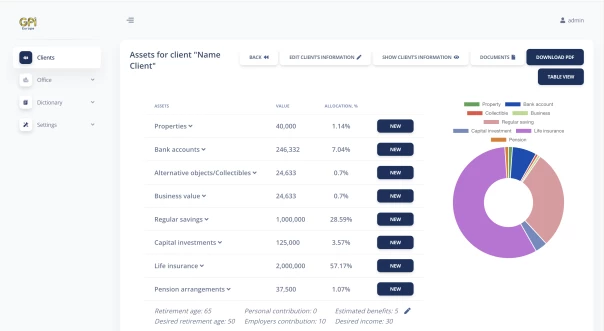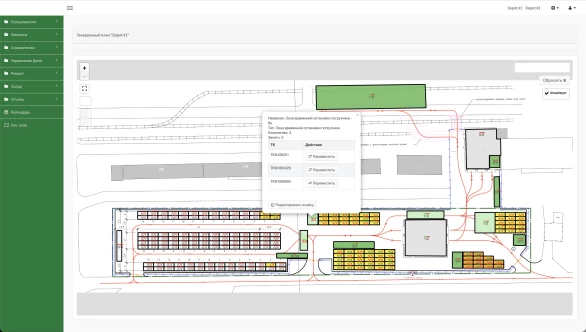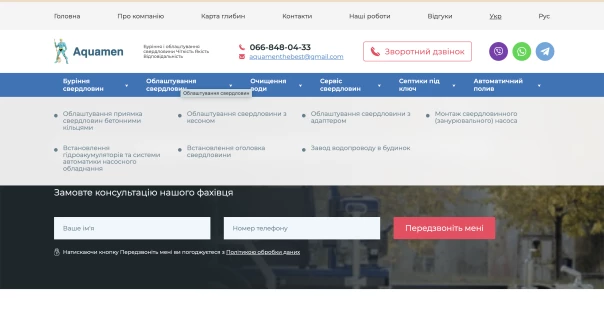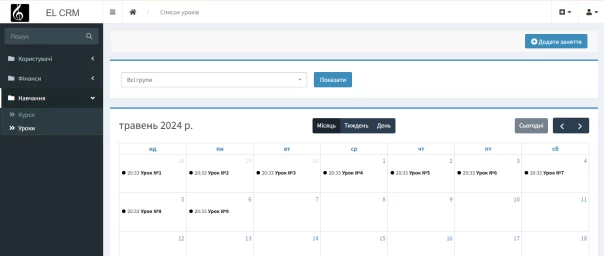ERP/CRM help for business
A brief description of various management system types. What role CRM and ERP systems play in business processes, who needs them.

CRM System Replatforming for Financial Consultants
More about the serviceCRM System Development
We provide a full range of services for the development and support of online stores, informational websites, CRM/ERP systems, and SEO optimization — from creating technical specifications and prototyping to configuration, launch, and ensuring the quality and stability of your product.

Development and Support of ERP for a Tank Washing and Repair Depot
More about the serviceERP System Development
We develop custom ERP systems — comprehensive solutions for automating and integrating key business processes (finance management, HR, production, supply chain, sales, and more). We provide a full cycle of services: needs analysis and technical specification development, architecture design, system development and integration with existing solutions, implementation with staff training, as well as technical support and regular updates.

Online stores for beauty professionals.
More about the serviceOnline Store Development
Online store development is a comprehensive process of creating an e‑commerce platform tailored to all client requirements — from preparing technical specifications, prototyping, and design to implementing the website and admin panel, testing, content integration, and ongoing support. This ensures a convenient UX for customers and seamless store operation.

Development of an SEO-optimized informational website for a well drilling company.
More about the serviceDevelopment of informational websites
The development of an informational website is essential for those who aim to showcase their activities online and attract new clients: a modern business card website allows for flexible content updates through an admin panel, displays news and links to social media, and is optimized for search engines, retaining existing audiences and increasing brand trust.

SEO website promotion — boosting visibility and attracting clients from search
We help businesses receive a stable flow of clients from Google. SEO promotion is not just about keywords, but a comprehensive set of work — from technical optimization and content to analytics and link-building.
We create business websites for companies of any size
We develop modern business websites that help present your company, attract new clients, and increase brand trust. These can be landing pages, corporate websites, or multi-page portals with additional functionality.

Content creation — texts, visuals, and videos for your business
We combine the power of artificial intelligence with the expertise of our copywriters, designers, and video editors. We create texts, visuals, and videos that help your brand look professional, communicate effectively, and attract customers.
We create convenient business card websites for companies of any scale
We develop business card websites that help quickly present services, increase recognition, and attract clients. Such websites are ideal for specialists, small companies, or brands that require a compact yet professional online presence.

Content management — professional content creation and support for your website
We take care of all tasks related to content creation, updates, and website structure. Content management is a set of services that includes adding texts, photos, products, news, SEO elements, and keeping your website up to date.

Server administration — stable performance, security, and productivity for your business
We provide full technical server administration to ensure your websites and services run reliably 24/7. Our team has been working for years with Hetzner — one of the most reliable European data centers. We know how to properly configure, optimize, and maintain the infrastructure for your project.
We create intelligent chatbots for Telegram, Viber, WhatsApp, and websites
We develop chatbots that automate customer communication, sales, and technical support. Bots help respond faster, collect requests, accept payments, and operate 24/7 without days off.

Screenshot of the warehouse management module
View Case
ERP system for managing a tank container cleaning and repair station, built on Symfony and deployed on Linux Ubuntu with MySQL for reliability and scalability. The solution includes an administrative panel and a client portal with 49 modules for managing clients, orders, finances, calendar, inventory, and reporting, with capabilities for automatic PDF invoice generation, notifications, and data export to accounting software for complete business process digitalization.

Homepage of the website, VIP announcements block
View Case
A platform for posting announcements in the agricultural sector, connecting farmers, suppliers, and buyers to streamline the buying and selling of agricultural goods and services with increased market transparency and reduced search costs. The system includes an admin panel for moderating announcements, managing content, and analytics, as well as a seller's personal account with the ability to publish and manage announcements and transaction history.

Homepage of the website, VIP announcements block
View Case
A CRM system for a financial consulting company, developed as a custom solution instead of a SaaS product to automate document management and enhance client interaction through admin and client interfaces, with capabilities to manage assets, users, calendars, and dictionaries, generate PDF reports, and synchronize events with Outlook. The project is built on Symfony with PHP 8.3, deployed on Ubuntu 22.04 with a MySQL 8.0 database to ensure system reliability, security, and scalability.

Main Menu of the Project
View Case
Informational website Aquamen for water well drilling services, built with a user‑friendly admin panel for managing users, content blocks, and a feedback module. It supports SEO features (automatic sitemap, no‑index/no‑follow) and sends notifications about new requests via a Telegram bot.

Home Page, Main Menu
View Case
Online store for beauty professionals, developed on Symfony 6.4 and PHP 8.3, deployed on an Ubuntu 22.04 server with a MySQL 8.0 database. It features an intuitive client interface with a product catalog, shopping cart, and order checkout, along with a powerful admin panel for managing products, categories, brands, users, orders, and SEO optimization. The system supports data export and automatic generation of PDF invoices and reports.

Website Home Page, Users, Finance, Learning
View Case
CRM system for a foreign language school designed to efficiently manage student relationships: it enables storing and structuring personal data, course history, and communication records, while automating registration, payment, and class scheduling processes through three key modules — Users, Finance, and Learning.

Website Home Page, Users, Finance, Learning
View Case
A custom CRM system for a service business in the truck detailing industry. The solution enables centralized management of clients, services, orders, payments, and staff, automates payroll calculations, and provides detailed business analytics.

Website Home Page, Users, Finance, Learning
View Case
A Telegram bot with an administrative panel was developed for the client, allowing for the automation of order intake, product catalog management, and request processing without operator involvement. The solution is designed for fast customer service and easy management for the business.

Website Home Page, Users, Finance, Learning
View Case
A fast start for your service business: an intuitive client-facing website, easy booking management, and simple service control via the admin panel.

Website Home Page, Users, Finance, Learning
View Case
An interactive web calculator for furniture businesses that allows customers to configure products independently, receive an accurate cost calculation, and generate a detailed PDF report with drawings.

Website Home Page, Users, Finance, Learning
View Case
A ready-made solution for launching an expert business focused on selling services and products. The website structure is adapted for scalable growth, easy content management, and fast project launch.

The desire to efficiently use resources drives managers to look for proven and productive solutions for work planning. One of the ways to improve the company's operations is to implement ERP systems. Together, we will explore their impact on business and find out whether it is appropriate to use one of them for you.
First, let's look at the terminology. An ERP system is software that implements the management function of an organization. To deepen the meaning of this concept, we need to decipher the abbreviation itself - Enterprise Resource Planning. It follows that ERP is an enterprise resource planning system.
The main function of an ERP system is to combine business processes into one interconnected structure. This helps to simplify, speed up and optimize the work of all departments quite effectively. The technology of implementing a unified database eliminates the need to enter information manually several times, reducing the number of errors.
The methods of a modern ERP system (analysis, data collection, and processing) have been improved by using artificial intelligence and access to the Internet of Things.
What does the system manage? It takes over the management of such areas as:
own activities (production or provision of services).
Not only logistics, trading, and manufacturing companies know what ERP is. Such information technologies are being implemented by companies that need to process large amounts of data on a regular basis and provide services promptly:
At the initial stages of business development, this tool is often not required - the process of establishing activities between departments is mostly manual. For large-scale organizations, ERP implementation is an essential service.
By creating a single information space, the enterprise resource planning system provides opportunities to manage all important communication nodes between employees and managers, as well as between all departments. The benefits of ERP implementation include the following.
The system allows you to effectively track financial transactions, including accounting for expenses, income, and taxes. By implementing an ERP system, you can automate accounting processes, reduce the likelihood of errors, and improve the accuracy of financial reporting. Thus, the manager will have information about the current financial condition of the company. This will allow them to make sound decisions about investments, budgeting, and strategic planning.
The ERP system also effectively optimizes various work processes. It not only takes into account product demand, but also automates production cycle planning, labor management, and resource utilization control. As a result, the company can produce at lower costs, with high product quality and a high speed of response to changes in market demand.
The system automates the ordering of materials, takes into account delivery times, and facilitates efficient inventory management. This not only helps to avoid production downtime, but also reduces the risks associated with inefficient product management. Thanks to this, there is no shortage or surplus in the warehouses.
In the field of HR, ERP technology covers personal data management, effective time tracking, payroll automation, and other aspects of human resource management. Optimizing staff performance increases productivity and improves communication within the organization.
An ERP system is software that collects and processes data for analysis to make informed decisions. Analytical tools help to track key performance indicators, identify trends, and develop strategies to improve enterprise performance.
In Ukraine, ERP systems were not actively developed until recently. Previously, much of the software used by Ukrainian companies was created abroad. However, the modern domestic IT market is actively replenished with new universal information technologies that are adapted to Ukrainian realities. Software developers also offer services to create ERP systems specifically tailored to the needs of a particular organization.
In order to understand whether to use an off-the-shelf system or develop an ERP for your own use, you need to know the advantages and disadvantages of each option.
A ready-made solution can be valuable:
The decision to implement an existing solution or to develop your own should be a deliberate one, taking into account the specific needs and capabilities of the company.

A brief description of various management system types. What role CRM and ERP systems play in business processes, who needs them.

ERP vs CRM - how to choose a software package for business. The purpose of each system. The main differences in ERP and CRM software systems. Criteria for choosing a program.

CRM systems in modern business. An effective tool for automating business processes. The advantages of integrating CRM into a company. An example of the system operation. Ready-made product or personal CRM to order - choosing a model.
Fill out the form to receive a free consultation
